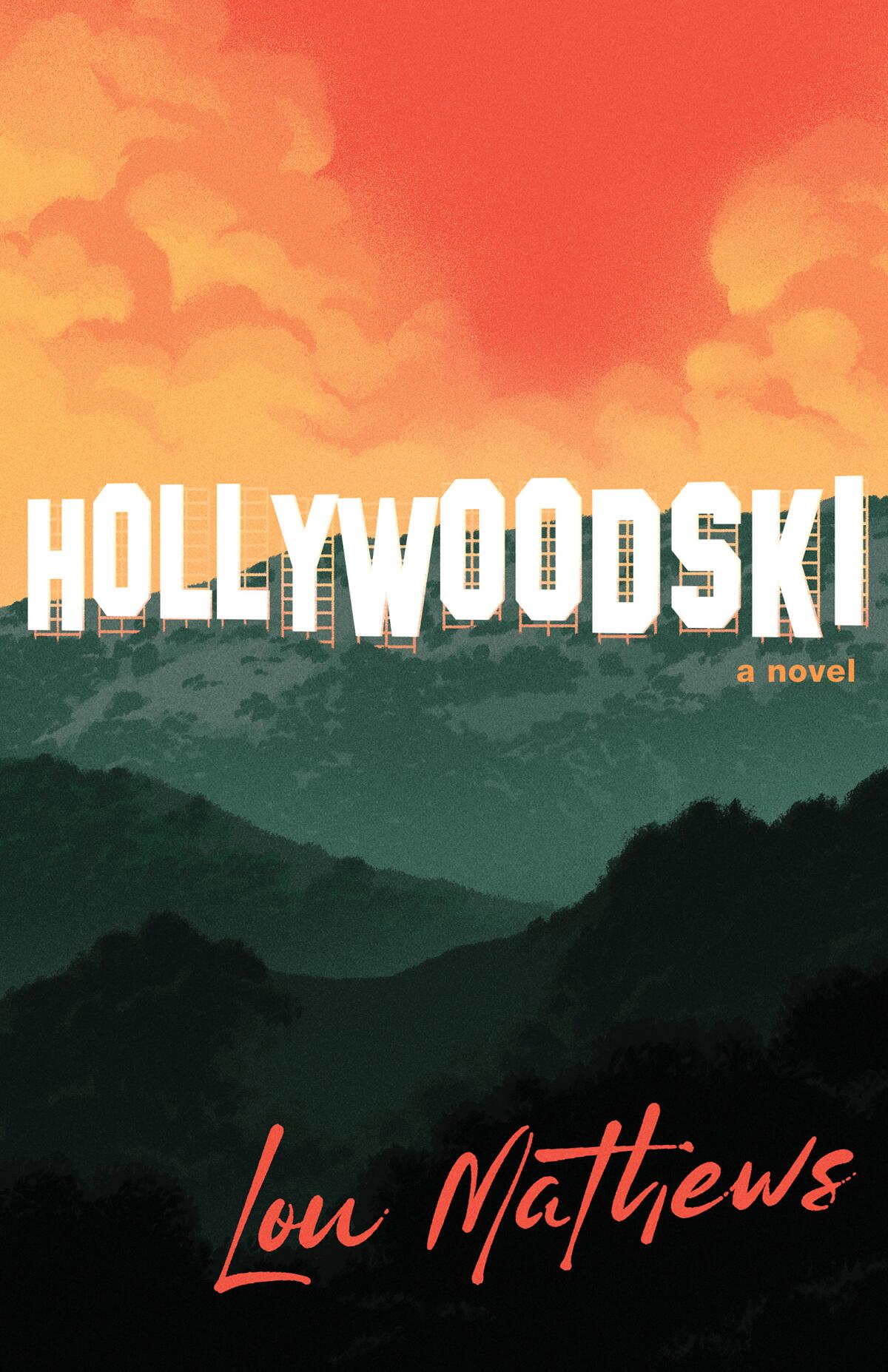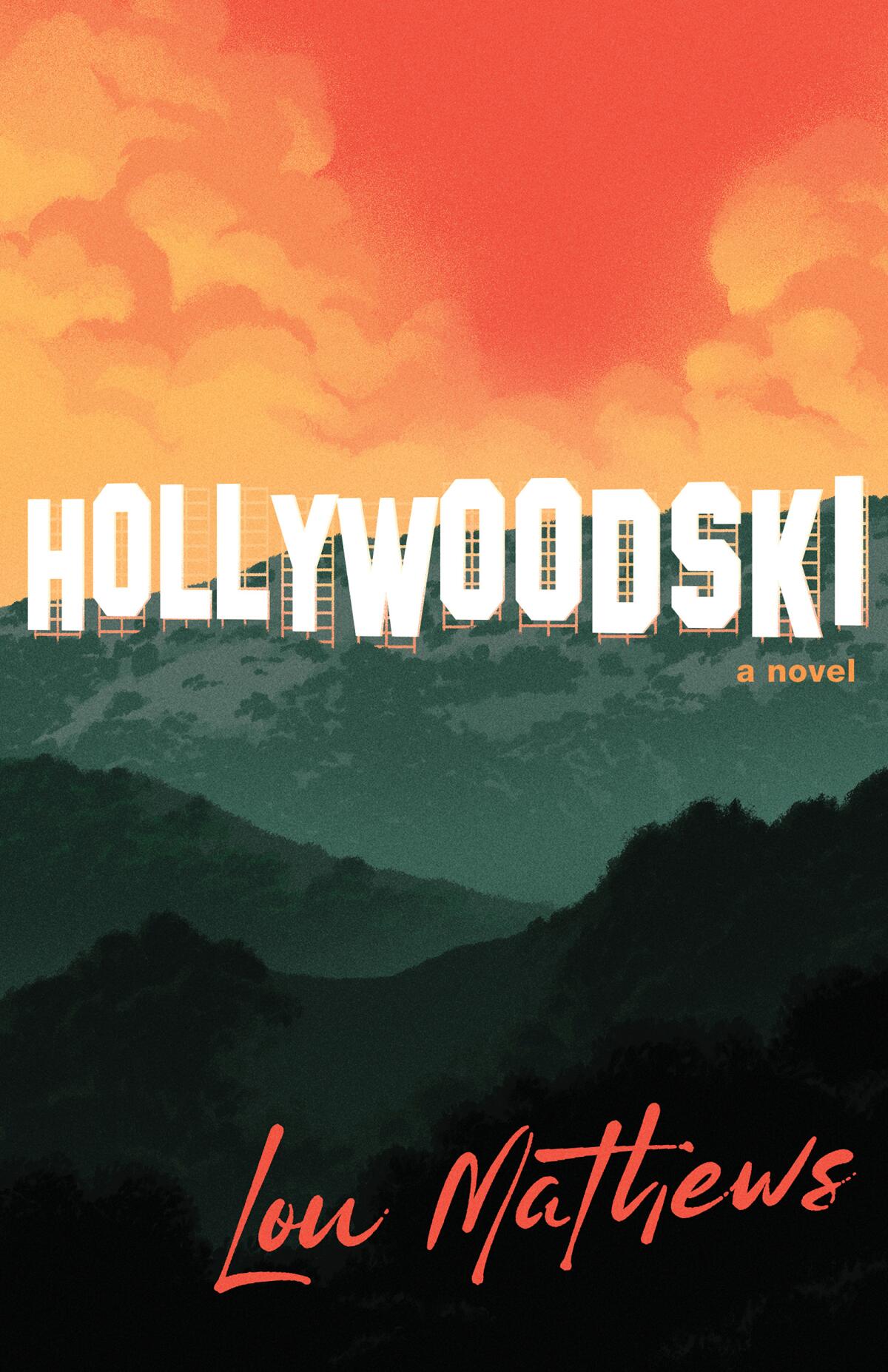Lou Mathews is unequivocal in his devotion to Los Angeles and its environs. “I love it — and I don’t understand people who don’t,” says the welcoming, white-bearded Mathews, 78, during a recent interview at his longtime Beachwood Canyon home conducted prior to the devastating fires that began Jan. 7. “I don’t think you can entirely understand it — and I’m going out on a limb here — unless you’ve been born here. That’s a hard stand to take but it’s just that it’s so diverse.”
Mathews loves Los Angeles. And that’s a good thing considering that not only is he a fourth-generation Angeleno (his California family dates back to the Gold Rush days) but he has written extensively about L.A. as a journalist, a short story scribe and a novelist.
The Glendale-born raconteur continues, “I describe it in another book as ‘the city of a thousand villages.’ It takes so long to learn the place.”
His latest work, “Hollywoodski,” which publishes on Jan. 21, is a novelized collection of short stories that takes a colorful, satirical and darkly affectionate look at L.A. through the eyes of fictional Hollywood screenwriter Dale Davis, a onetime success now hovering on the fringes of show business.
In “Hollywoodski,” we follow the never-say-die Davis around his favorite local haunts, including Hollywood’s Musso & Frank Grill, Du-Pars in the Original Farmers Market and, especially, an old-school bar called Bowdler’s (a made-up knockoff of such Hollywood mainstays as the Frolic Room and the Power House), as he spins first-person yarns from the screenwriting trenches. He’s often accompanied by his day-drinking pals Jaime and Oscar, two other inventively drawn La-La Land castoffs with their own eccentric show biz travels and travails.
Readers will also end up in Orange County, rural Texas and Nicaragua as Mathews captivates with stories inspired by his observations and true-life experiences rubbing elbows with an eclectic array of Hollywoodland denizens.
Of the book’s 15 largely chronological stories (including several written as if by Davis himself), most have been previously published in literary journals such as “The New England Review,” “Chicago Quarterly Review” and “Black Clock.”

“Hollywoodski,” by Lou Mathews.
But Mathews didn’t initially consider that his quirky Tinseltown tales might one day add up to a publishable book. “I work in a really, really byzantine fashion,” he explains. “The first story in that book was written probably 35 or 40 years ago,” Mathews says of “Individual Medley,” a wistful snapshot of a former competitive swimmer.
“It’s one of the stories attributed to Dale Davis,” the author continues. “One of the things I decided to do was have stories ‘written’ by Davis, which chart his sort of spiritual flow. Though he gets quite crazy by the end when you get to the Philip K. Dick story,” he says, referring to the surreal “Persecution Street & Hazard Avenue, the Corner Of…,” “Hollywoodski’s” penultimate tale puckishly credited to visionary science-fiction author Dick “as told to D. Dale Davis.”
“But I didn’t know at that point there was a book,” Mathews recalls as he serves an impressive home-cooked lunch of French onion soup and mustard-tarragon chicken in honor of a recent trip to Paris he took with his wife, Alison, a poet and retired lawyer.
As the years went on, Mathews expanded his Davis-centric oeuvre into what he calls “the cinematic stories.” After he wrote “Some Animals Are More Equal Than Others,” a serendipitous recount of how Davis found himself co-writing and directing an ill-fated remake of Sam Peckinpah’s unsung western “Bring Me the Head of Alfredo Garcia,” Mathews found that the stories started to fit an overall narrative and “became a progression.”
“I then knew there was a book there and knew the stories that had to be written,” he says. “But assembling it just took a long, long time. It was probably a 10-year period. And then the last four or five stories, which form a kind of patchwork where you’re filling in the gaps, were written in the last year.”
Mathews further explains, “I think about stories for a long time before I write them, but the writing process is fairly fast once I start. There’s very little editing; most of the time it’s cuts. I really like taking things down to the bone.
“I guess I’m something of a miniaturist,” he notes with a laugh.
Although Mathews never really considered using these stories and characters as a basis for a more traditional Hollywood novel — his own “The Day of the Locust” or “The Player” — he’s no stranger to the form. His first novel, “L.A. Breakdown,” published in 1999, was a straight narrative. It involved the late-1960s drag racing scene and vibrantly drew from Mathews’ pre-writer past as a car mechanic, street racer, champion of the working class and Chicano ally. The book was chosen by The Times as one of the best of the year.
His second published novel, 2021’s “Shaky Town,” was, like “Hollywoodski,” a linked assemblage of short stories, but set in East L.A. in the 1980s. A review on the website “Los Angeles Literature” compared it to Leonard Gardner’s 1970 novel “Fat City,” unsurprisingly, a favorite read of Mathews. In addition, the book’s Pushcart Prize-winning story, “Crazy Life,” was adapted into a 2005 short film by Texas writer-director Dora Peña.
Drawing on his love of movies, often those from the 1970s, Mathews peppers “Hollywoodski” with a trove of name-checks from the sublime (“The Last Picture Show,” “Chinatown,” “The Parallax View”) to the ridiculous (“The Thing With Two Heads,” “Frogs,” “The Black Gestapo”) as he chronicles the escapades of protagonist Davis, his Runyonesque cohorts and other Hollywood wild cards.
As an added kick for film buffs, his characters often cite choice movie dialogue as a kind of conversational shorthand. But if someone gets a line wrong, someone else will happily correct them. The title story alone references dialogue from 1948’s “Joan of Arc,” 1961’s “The Hustler” and 1967’s “In the Heat of the Night,” with other random shout-outs to such pictures as “Easy Rider,” the 1976 “King Kong” remake, “Kansas City Bomber” and “Two-Lane Blacktop.” To repeat: that’s all in one chapter.
Given that he writes about what he knows, has lived and has loved, it’s no surprise to learn from Mathews that he, like Davis, was once involved in penning a doomed remake of “Alfredo Garcia.” It was Mathews’ first professional foray into screenwriting — and his last.
“I loved taking apart that script and rewriting it,” he says, “but I had no patience for what came next. It took too long to get answers because of the money involved and I was spoiled by the godlike powers you have writing fiction and plays, where there’s far less money but far more freedom.”
Although he’s known his share of notable film and TV writers including Alex Cox (“Repo Man”), Jim Gavin (AMC’s “Lodge 49”) and Howard A. Rodman (“Joe Gould’s Secret”), Mathews says that Davis is not based on any one real screenwriter but is more of an amalgam. Still, he’s encountered the type.
“I have a bunch of friends who had, like, a hit and have sort of lived on that,” he says. “But it’s such a strange business, too.” Mathews continues, “I look at friends who made the wrong choice, who turned down the low-budget independent gig to take the high-priced job and the low-budget gig turned out to be a ‘Drugstore Cowboy’ or ‘Reservoir Dogs’ and the high-paying gig turned out to be something that came and went. That happens a lot.”
As for the future, Mathews is looking forward to making the promotional rounds for “Hollywoodski” and continuing to teach fiction writing, as he has since 1989, for the UCLA Extension Writers Program.
He also has more than a few short stories still in him, including one that, Mathews says, “has been kicking my ass for 30 years called ‘The Death of a Democrat.’ ” He adds wryly, “That’s particularly appropriate right now, don’t you think?”
Goldstein is an L.A.-based journalist, playwright, screenwriter and novelist.
Mathews will appear for a conversation and book signing at 6 p.m. Jan. 25, Chevalier’s Books, 133 N. Larchmont Ave., Los Angeles. eventbrite.com
